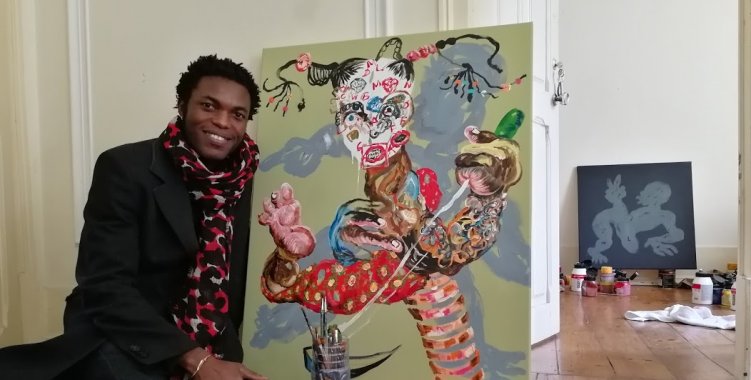Curated by Canadian Katherine Sirois, the exhibition takes its title from an expression, referring to politics, which, in Angola, popularly designates something that is “dysfunctional, inefficient, fraudulent, inappropriate or unfair”, according to a statement from the gallery.
"This reference highlights the questioning of the cunning and intangible nature of the 'system' that haunts the large-scale works" of the Angolan artist, reads the exhibition's presentation.
The selection of paintings – which also expresses a reflection on "the deeply rooted and widespread mentalities of division and opposition, the conflicts of interests or the exercise of power, its conquest and preservation at all costs" - proposes to "question and stimulate reflection on imperialism, rivalries and power games between individuals, tribes, regions, countries, genders or even between States and their populations".
Born in Angola in 1982, Cristiano Mangovo currently lives and works in Lisbon.
Born in Cabinda, his vision, imagination and references are rooted in the socio-cultural landscape of that region.
His early interest in drawing led him to study painting at the Academy of Fine Arts in Kinshasa, and his work, in the style of figurative expressionism, is considered by critics as "one of the most prolific among the painters of the Angolan post- war".
In his work, he uses archetypal typologies and symbols to explore issues such as injustice, inequality, poverty and ecocide, both locally and universally.
His work is part of several art collections such as the Africana Art Foundation (Switzerland), the Centro Cultural Brasil (Angola), Dâr-al-Makhzen (Morocco), Fondation Gandur pourl'Art (Switzerland), the United Nations Fund for the Population (RDC) and the Museum of the Presidency of the Portuguese Republic.
Cristiano Mangovo reflects on power games at the exhibition “O Sistema” in Lisbon
An exhibition by the Angolan artist Cristiano Mangovo, with paintings that address complex socio-political issues, such as the exercise of power and hierarchies, opens on Friday at the Insofar Gallery in Lisbon.







